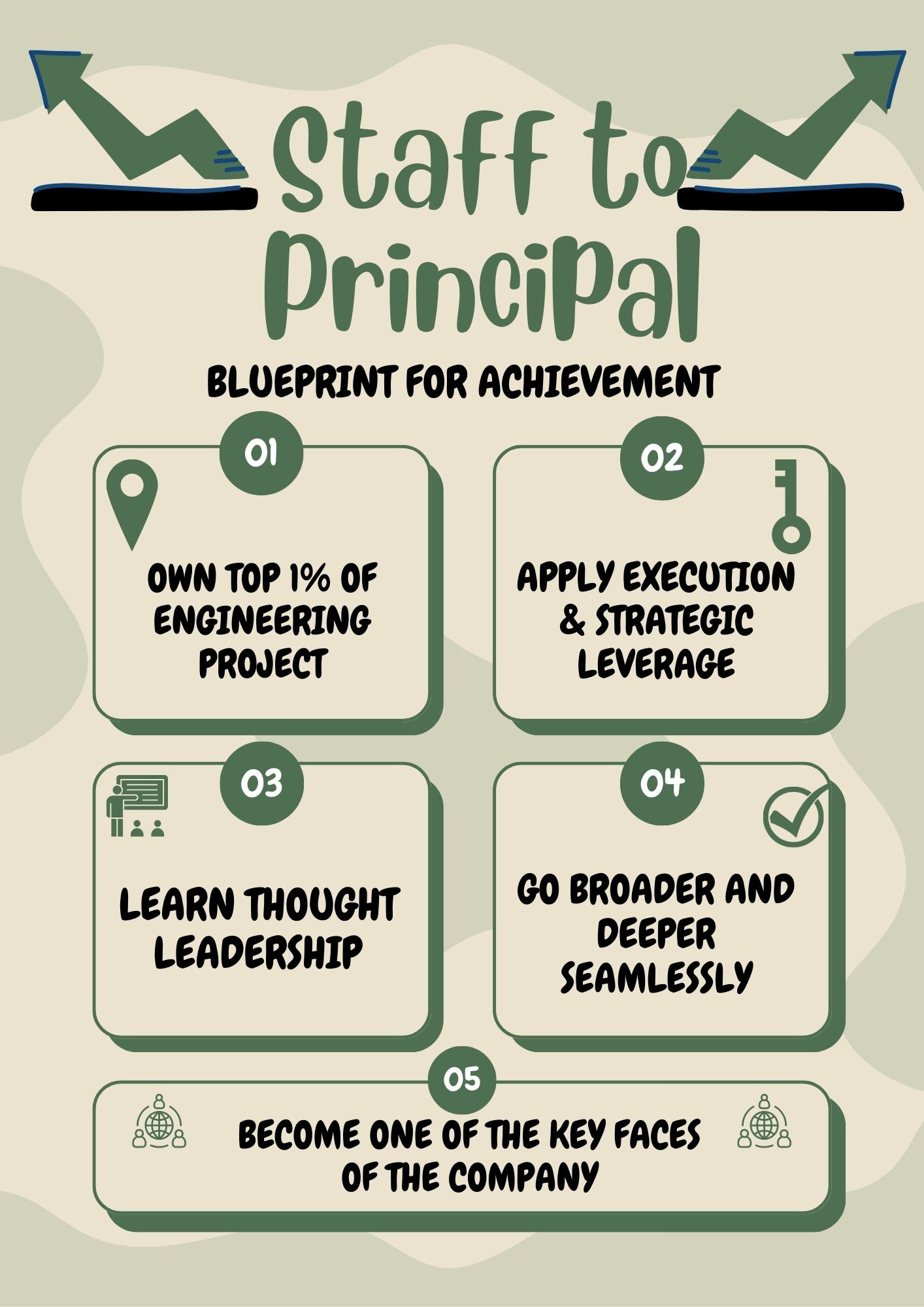How to level up as a Software Engineer despite having setbacks? - Part III (Staff to Principal Eng)
Rising from Adversity to Ascendancy
👋 Hey there, fellow tech enthusiasts, professionals, and wanderers of the digital realm! 🚀
I am Gourav. I write about Engineering, Productivity, Thought Leadership, and the Mysteries of the mind!
How to get promoted from Staff to Principal Engineer despite having setbacks?
This is the third and final part of the multi-part series. We'll explore the journey from Staff to Principal Engineer. (Promotion from Principal to Distinguished Engineer is super rare, so I won’t go that far). Part 1 focused on progressing from a new grad to a Senior Engineer, while Part 2 covered transitioning from Senior to Staff Engineer.
Some companies have a Senior Staff level. By aiming directly for the Principal Engineer, we effectively cover aspects of both roles.
With that in place, let’s get started with actionable insights on a journey that is close to my heart (I am currently treading on this path)!
Staff → Principal Software Engineer
Experience years: 10-20 (lower experience promotions are rare; the more senior the better)
Current titles: Staff (Software) Engineer, Staff Tech-Lead, Architect, Staff Lead
Target Titles: Principal (Software) Engineer
Scope: Company-wide Impact Projects, Leadership, Technical and People skills, Business Mindset.
Much Needed Context Section:
Besides the context for Staff Promotions, I would like to give insights into the Principal level:
Promotion to Principal Engineer is rare. This level makes up the top 1% of the population at the company. You are definitely not expected to reach this level.
Getting hired as a Principal is intimidating. Even those with special expertise in fields such as AI, supply chain, crypto, and infrastructure, and having industry and business acumen may face challenges in getting hired as Principals.
Principal Engineer = (Top Management Chain work [Director / VP / CTO] - Core People Management + Strong Tech Expertise). Principal engineers need to have people management skills but here I am excluding typical resource allocation and empire-building stuff.
While I'm outlining various paths to the Principal Engineer in an action-item format, it's important to note that there's no singular guaranteed route. The journey is inherently ambiguous and challenging, and despite diligent efforts, success is not assured - For e.g. it’s fair for a company to not need this level at all.
With this, let’s get started:
Action Items
Beyond typical Staff Engineer responsibilities, you must also do the following:
Own Top 1% of Engineering Project and land Company-wide Business Impact:
The top 1% Engineering Project spans many teams or the whole company’s way of doing day-to-day Engineering. These are the things that all other engineers take for granted and often affect the company’s bottom line.
Examples include but are not limited to:
Choosing a language for the whole company and setting up its infrastructure - build and deploy the system.
Migrating the company’s database from SQL to NoSQL or vice-versa.
Building Business Foundational Frameworks like Payment Gateway Systems.
Introducing safe build-deploy practices by building abstractions and tools like REST APIs interceptor layer.
Execution & Strategic Leverage
As one human being, you can only code so fast, there is a limit to what an individual can do. Folks on the path to PE understand this clearly and are a really efficient force multiplier.
This would mean having an influence on many other engineers in the company. Strategically leveraging them and working through them to execute shared goals in a meaningful manner.
That’s why even when you are targeting the PE level, which is an IC role, you still need to be a good people person. Here’s why naively, many go into management because they think, ‘If I can have a team of people who do what I say, I will have more leverage and more impact.’
Thought Leadership: It is absurdly vague but let me boil it down to two points:
PE’s opinions matter a lot, not just to other Engineers but also to the C-Suite. CTOs, often look forward to hearing their thoughts and opinions on a strategic business move.
In this position, you share innovative ideas, insights, and opinions with others. You do this to influence, inspire, and lead the industry or community. You also take the hit when things go wrong.
Ability to move broader and deeper seamlessly.
You have Know-how at a high level of the whole company.
You can move across business domains, technologies, teams, and leaders with fluidity.
People wait to seek your advice before doing stuff.
Be one of the Key faces of the company:
This doesn’t mean becoming a celebrity, (that’s for C-Suite - pun intended).
You must deliver Tech Talks and key Notes at Inter-Company events. Also, you must conduct key events and make the processes lightweight and automated.
You repeatedly experiment with new tools and technologies in the industry and propose the company adopt or sunset a few.
You are a natural mentor at scale via your knowledge-sharing sessions.
There is much more to it. This is because such a role needs and covers a lot of different areas and skills. But, if you do these, there's a high chance it'll bring you closer to your Principal Promotion.
Acceptable setbacks and how to learn and overcome those
The bar for Principal Engineer is so high that any visible setback could cause drastic repercussions on your path to promotion.
However, it’s hard to be consistently in coding mode for some staff engineers when they are on the path to PE as don’t get enough time for it due to other high-priority responsibilities.
As long as the leadership is aligned, they won't see this as a setback, but if they are not cautious, they could perceive it as actionable feedback. The key is still to remain hands-on with coding and find some dedicated time for it.
Some Housekeeping
I have heard from some of the subscribers that the newsletter email sometimes goes to their spam or promotions folder.
Please move your newsletter emails to the primary folder, add gouravkhanijoe@substack.com to your email contacts, or simply reply to this email saying “Hi”!
In case you missed any previous editions due to this, please read all of them here.
Special Thanks
- Author of the Leading Developers newsletter, for providing valuable feedback and support to this newsletter.
- Author of the Techlead Mentor newsletter for cross-post collaborative efforts.
- Author of Strategize Your Career newsletter for supporting my voice.
- Author of the High Growth Engineer newsletter for conversational support and feedback.
- Author of Developing Skills newsletter for recommending this newsletter.
In case you missed my previous articles…
How to level up as a Software Engineer despite having setbacks? - Part II (Sr. to Staff Eng)
Secret to become a Staff+ Engineer swiftly
Access the full archive here.
Your thoughts matter! Comment or reply with your post ideas—I'm all ears and ready to turn your concepts into content! 🙋♀️🙋♂️
Let’s Connect
If we haven't crossed paths previously, I'd be delighted to receive a message from you!
Sponsorship
Unlock the potential for your business to shine! Simply reply to this email or DM on LinkedIn, and let's embark on this exciting journey together. Here are the details of various sponsorship packages.
Collaboration on mind?
I am more than happy to collaborate! Whether it's cross-content sharing, podcasts, or interviews, let's create something amazing together. My DMs are open on LinkedIn.
Also, don't hesitate to reply to this email and introduce yourself. I make it a point to respond to every direct message, email, and comment.
Follow me for daily informational
Follow me on LinkedIn for daily interesting bytes, discussing all things software engineering, leadership, financial freedom, mindfulness, productivity —let's connect:
Be the change you want to see,
Gourav Khanijoe







Great write-up, Gourav and thanks for the mention!
Looking forward to more :)
Thanks for the mention, Gourav!
The higher the seniority, the more their impact is not reflected through an individual action but the waves their actions leave at their back, like in the picture you have at the end of the post ;)